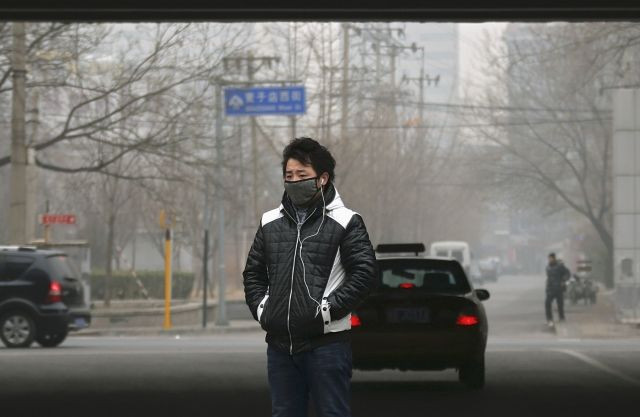Beijing Blanketed In ‘Hazardous’ Smog For Fourth Day

Air pollution in Beijing remained at "hazardous" levels for the fourth consecutive day Monday, despite the skies clearing up marginally in comparison to the weekend when the city was blanketed in dense smog.
Primary and middle schools in the worst polluted areas of Beijing were ordered to halt outdoor activities from Sunday when the Air Quality Index hit 500, the highest level.
The U.S. Embassy in Beijing recorded "hazardous" levels of pollution, with a "Beyond Index" reading of 515 Monday 3:00 a.m. local time. The reading has dipped since morning and recorded 271 at 3:00 p.m. local time, as the air quality level remained “very unhealthy.”
The air quality reading, based on the recently revised standards of the American Environmental Protection Agency (the EPA), shot up Saturday evening, hitting as high as 755.
Construction activities were suspended at 28 sites and 54 businesses reduced their emissions by 30 percent, with Beijing Hyundai Motor Company halting production Sunday, Xinhua news agency reported citing Beijing Municipal Environmental Protection Bureau.
Fourteen inspection teams were sent to 14 districts and counties to oversee the pollution-reduction measures Sunday, the report said.
Beijing has a permanent population of around 20 million and some 5.2 million vehicles, according to Xinhua.
The smog is expected to continue until Wednesday in Beijing, Chinese media has reported citing local meteorologists.
Beijing, infamous for its poor air quality, has periodically recorded high levels of smog and pollution.
In January last year, Chinese New Year celebrations were marred by extraordinarily high levels of smog and pollution. In December 2011, Beijing Capital International Airport was forced to cancel hundreds of flights due to the thick layers of smog and poor visibility.
The World Health Organization estimated in 2007 that 656,000 Chinese died prematurely each year from ailments caused by indoor and outdoor air pollution.
The World Bank placed deaths related to outdoor pollution at 350,000 to 400,000 but removed those figures from a 2007 report under pressure from the Chinese government.
© Copyright IBTimes 2025. All rights reserved.






















